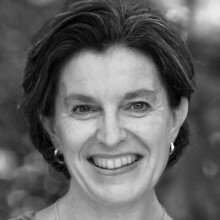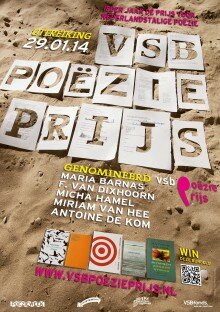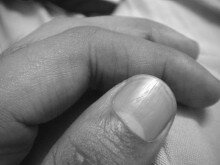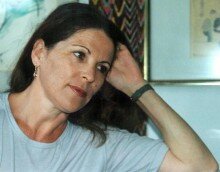
Born and raised in Chatham, Virginia, Claudia Emerson studied writing at the University of North Carolina, Greensboro. Emerson’s poetry, steeped in the Southern Narrative tradition, bears the influences of Ellen Bryant Voigt, Betty Adcock and William Faulkner. Of the collection Late Wife (2005), poet Deborah Pope observed, “Like the estranged lover in one of her poems who pitches horseshoes in the dark with preternatural precision, so Emerson sends her words into a different kind of darkness with steely exactness, their arc of perception over and over striking true.”
I did keep
the mirror, perhaps because like all mirrors,
most of these years it has been invisible,
part of the wall, or defined by reflection—
safe—because reflection, after all, does change.
I hung it here in the front, dark hallway
of this house you will never see, so that
it might magnify the meager light,
become a lesser, backward window.
(from ‘Frame, An Epistle’)
“The fruitful tension between line and sentence is extremely important to me – in my work and in others’ . . . I work hard to craft lines with formal integrity, so the line itself will have what Mary Kinzie calls ‘half meaning.’ The poem can only be so long and maintain that kind of intensity as a stand-alone thing; in sequence, though, the linked or recurring images create the longer poetic experience,” explains Emerson in an interview with Shenandoah magazine. To understand the value of sequential poems in Emerson’s work, read ‘Environmental Awareness: The Right Whale’, ‘What They Are Missing’, ‘Physical Education’, and ‘Reunion Weekend’, which are part of a twenty-five poem sequence called ‘All Girls School’ published in Figure Studies. (The two ‘Early Elegy’ poems are also part of a sequence.) Form is elegantly tied to subject in Emerson’s work. In Late Wife, for example, many of the poems are sonnets in which the first stanza focuses on the past and the second stanza moves the poem into the present. Most of ‘All Girls School’, by contrast, relies on couplets:
But after it was no longer needed for fat,
men still hunted the whale for its rich mouth
of baleen, harvested for hairbrushes,
buggy whips, umbrella ribs, the stays
of corsets—vain things designed to mold the female
body, sculpt a waist so small a man's
hands could meet with ease around it.
(from ‘Environmental Awareness: The Right Whale’)
Emerson’s several volumes of poetry include Pharaoh, Pharaoh (1997); Pinion: An Elegy (2002); Late Wife (2005), which won the Pulitzer Prize; and Figure Studies: Poems (2008).
Her honours include fellowships from the Library of Congress, the Virginia Commission for the Arts and the National Endowment for the Arts. In 2008 she was appointed poet laureate of Virginia, a two-year role.
Emerson has been poetry editor for the Greensboro Review and a contributing editor for Shenandoah. She has taught at Washington and Lee University, Randolph-Macon Women’s College and the University of Mary Washington.
Bibliography
Pharaoh, Pharaoh, LSU Press, Baton Rouge, 1997
Pinion, An Elegy, LSU Press, Baton Rouge, 2002
Late Wife: Poems, LSU Press, Baton Rouge, 2005
Figure Studies: Poems, LSU Press, Baton Rouge, 2008
Secure the Shadow: Poems, LSU Press, Baton Rouge, 2012
Links
PBS NewsHour: Claudia Emerson Wins Pulitzer Prize for Poetry,” audio and transcript
Poetry Daily: Interview with Claudia Emerson in Shenandoah
Poetry magazine podcast: Insistent Traces video with Claudia Emerson









